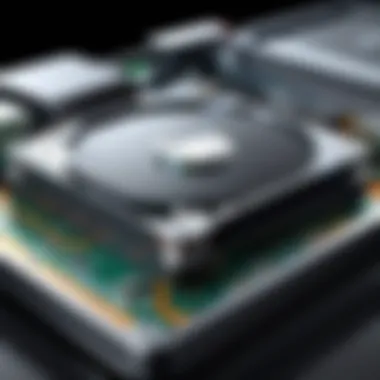Unleashing the Potential of 4TB 7200 RPM Hard Drives for Cutting-Edge Computing


Product Overview
In scrutinizing the realm of 4TB 7200 RPM hard drives, it is imperative to begin with a comprehensive product overview that sheds light on the distinctive features and capabilities of these storage solutions. From brand information to key specifications and pricing details, this section will dissect the essence of these high-capacity, high-speed hard drives to provide a solid foundation for readers.
Performance Comparison
Delving deeper into the analysis, the performance comparison segment will conduct rigorous benchmark tests to evaluate the speed and efficiency of 4TB 7200 RPM hard drives in comparison to other storage options available in the market. By presenting empirical evidence and objective data, readers will gain valuable insights into the real-world performance metrics and competitive edge offered by these storage devices.
Features and Technology
Unveiling the intricacies of features and technology, this section will explore the unique attributes and technological advancements embedded in 4TB 7200 RPM hard drives. From compatibility with various devices to innovative functionalities, readers will grasp a deeper understanding of how these hardware components seamlessly integrate into modern computing environments.
Pros and Cons
Drawing attention to the strengths and areas for improvement, the pros and cons segment will offer a balanced perspective on the advantages and limitations of 4TB 7200 RPM hard drives. By critically evaluating the product's benefits and drawbacks, readers can make informed decisions based on a nuanced analysis of its performance and utility in different scenarios.
Value for Money
Assessing the cost-effectiveness and long-term benefits, the value for money section will outline the economic value proposition of investing in 4TB 7200 RPM hard drives. By comparing the price point with similar products and highlighting the tangible benefits over time, readers will gain clarity on the long-term value and return on investment associated with these high-performance storage solutions.
Introduction to 4TB RPM Hard Drives
In the realm of modern computing, the advent of 4TB 7200 RPM hard drives has redefined storage solutions. These high-capacity, high-speed drives stand out for their exceptional performance and efficiency, catering to the needs of users who demand optimal functionality from their devices. The significance of introducing 4TB 7200 RPM hard drives lies in their ability to store vast amounts of data while ensuring quick access and data transfer speeds. By exploring the benefits and considerations surrounding these drives, users can leverage their capabilities effectively to enhance their computing experience.
Understanding the Basics
Defining Storage Capacity
A crucial aspect of 4TB 7200 RPM hard drives is their storage capacity, which refers to the amount of data that can be physically stored on the drive. This feature plays a vital role in accommodating large files, software applications, and multimedia content. The substantial storage space offered by these drives optimizes users' ability to store extensive data without compromising performance. However, it is essential to consider that higher storage capacity may lead to increased costs and power consumption, impacting the overall efficiency of the system.
Exploring Rotations Per Minute (RPM)


Rotations Per Minute (RPM) is another key aspect of 4TB 7200 RPM hard drives, indicating the speed at which the hard disk platter rotates within the drive. Higher RPM values translate to faster read and write operations, resulting in improved performance and quicker access to data. The 7200 RPM speed of these drives signifies their ability to deliver efficient data processing for users handling data-intensive tasks. While the high RPM enhances speed and responsiveness, it is essential to balance performance with energy consumption to optimize the overall functionality of the system.
Evolution of Storage Technology
Historical Overview
A comprehensive understanding of the historical evolution of storage technology provides valuable insights into the advancements that have shaped contemporary hard drives. The development of 4TB 7200 RPM hard drives reflects a progression from lower capacity and slower storage solutions to the current high-speed, high-capacity drives. Historical insights illuminate the significant milestones and innovations that have culminated in the efficiency and performance of modern storage devices, offering users a glimpse into the evolution of data storage.
Technological Advancements
The continual technological advancements in storage technology have propelled 4TB 7200 RPM hard drives to the forefront of contemporary computing solutions. Innovations such as improved data transfer rates, enhanced durability, and advanced error correction mechanisms have optimized the functionality of these drives. Technological advancements have not only increased storage capacities but also enhanced data security, ensuring the integrity and reliability of stored information. Embracing these advancements enables users to harness the full potential of 4TB 7200 RPM hard drives for various computing needs.
Benefits of 4TB RPM Hard Drives
In the expansive realm of modern computing, the significance of employing 4TB 7200 RPM hard drives cannot be overstated. These high-capacity storage solutions offer a blend of superior performance, efficiency, and ample storage space, catering to the increasing demands of today's digital landscape. From handling data-intensive tasks to supporting multimedia content, these hard drives stand out as reliable and efficient tools for users across various industries. Understanding the benefits of utilizing 4TB 7200 RPM hard drives is crucial in maximizing productivity and optimizing workflows.
Enhanced Performance
Speed and Efficiency
At the core of the appeal of 4TB 7200 RPM hard drives lies their exceptional speed and efficiency. With a rotation speed of 7200 revolutions per minute, these drives offer swift data access and transfer rates, resulting in enhanced overall system performance. The high RPM ensures quick read and write operations, making them ideal for applications requiring rapid data processing. This inherent speed and efficiency contribute significantly to the seamless execution of tasks, making these hard drives a popular choice for users seeking optimal performance and responsiveness.
Optimized Workflows
Another key aspect that sets 4TB 7200 RPM hard drives apart is their ability to streamline and optimize workflows. By providing a stable and high-speed storage environment, these drives facilitate smooth data handling and quick access to critical information. This optimization of workflows translates to improved productivity and reduced downtime, particularly in scenarios where time-sensitive tasks are involved. The unique feature of optimized workflows in these hard drives ensures that users can work efficiently and effectively, meeting deadlines and performance targets with ease.
Ample Storage Capacity
Multimedia Content
The ample storage capacity of 4TB 7200 RPM hard drives plays a vital role in managing multimedia content effectively. With modern applications and media files becoming increasingly larger in size, the need for expansive storage solutions is more pronounced than ever. These hard drives offer the space required to store vast libraries of photos, videos, and music, allowing users to access their multimedia content without constraints. The key characteristic of supporting multimedia content underscores the versatility of these drives in accommodating diverse digital assets, making them a valuable asset for content creators and entertainment enthusiasts.
Data Intensive Applications


For users engaged in data-intensive applications, the robust storage capacity of 4TB 7200 RPM hard drives proves to be indispensable. Handling large datasets, complex algorithms, and intensive computing processes necessitates ample storage space to prevent bottlenecks and system slowdowns. These hard drives excel in providing the room required for such demanding tasks, ensuring smooth operation and efficient data access. The unique feature of supporting data-intensive applications positions these drives as reliable companions for professionals working with substantial volumes of information, enabling seamless execution and analysis.
Applications in High-Performance Computing
In the realm of high-performance computing, the utilization of 4TB 7200 RPM hard drives plays a pivotal role in enhancing overall system efficacy and speed. These drives are essential components for professionals seeking advanced data processing capabilities and seamless content creation. By incorporating these storage solutions into high-performance computing environments, users can expect unparalleled performance optimization and enhanced workflow efficiencies. These drives cater to the growing demands of data-intensive applications and multimedia content creation, making them indispensable in modern computing setups.
Professional Environments
Data Analysis
When delving into the domain of data analysis, the focus is primarily on extracting valuable insights from vast datasets quickly and efficiently. 4TB 7200 RPM hard drives are instrumental in handling large volumes of data required for intricate analytical processes. The high-speed performance of these drives ensures swift data access and processing, leading to streamlined operations in professional settings. Data analysis thrives on the ability to process information rapidly, a feat made possible by the robust capabilities of 7200 RPM hard drives. While offering immense processing power, these drives also exhibit reliability and durability, making them ideal for extensive data analysis tasks.
Content Creation
In the realm of content creation, the significance of 4TB 7200 RPM hard drives cannot be overstated. These drives provide ample storage capacity essential for storing multimedia files, design assets, and project files seamlessly. Content creators rely on the speed and efficiency of these drives to work on high-definition video projects, graphic design tasks, and audio production without any performance hiccups. The smooth workflow facilitated by these drives allows professionals to focus on the creative process without being hindered by storage limitations or slow access speeds. Despite the high-capacity storage these drives offer, they maintain swift data retrieval rates, crucial for uninterrupted content creation workflows.
Gaming and Multimedia
Immersive Gaming Experiences
Immersive gaming experiences are at the core of modern gaming trends, where realism and interactivity are paramount. 4TB 7200 RPM hard drives contribute significantly to these experiences by offering quick data loading times, reducing in-game lags, and ensuring smooth gameplay. The high rotational speed of 7200 RPM drives minimizes loading times for large gaming files, allowing gamers to dive right into their virtual worlds without delays. In high-performance gaming setups, these drives are essential for storing extensive game libraries and enabling quick access to game data, enhancing the overall gaming experience.
Media Production
In the realm of media production, efficiency and reliability are key, making 4TB 7200 RPM hard drives the go-to storage solution for professionals. Media producers work with large video files, high-resolution images, and complex editing projects that demand substantial storage space and rapid data transfer speeds. These drives offer the perfect balance of capacity, speed, and reliability required for seamless media production workflows. By leveraging the robust capabilities of these drives, media professionals can store, access, and edit their media projects with ease, ensuring timely delivery and superior output quality.
Considerations for Choosing 4TB RPM Hard Drives
When delving into the realm of 4TB 7200 RPM hard drives, it is paramount to consider a range of crucial factors that can significantly impact the performance and efficiency of your computing setup. The choice of hard drive plays a pivotal role in determining the overall functionality and responsiveness of your system. By scrutinizing elements such as compatibility, system requirements, reliability, and durability, users can make informed decisions that align with their specific needs and preferences. This section aims to elucidate the essential considerations for choosing 4TB 7200 RPM hard drives to empower users with the knowledge necessary to optimize their computing experience.
Compatibility and System Requirements


Interface Connectivity
In the context of 4TB 7200 RPM hard drives, the aspect of interface connectivity emerges as a critical determiner of performance and compatibility with existing hardware configurations. The type of interface, such as SATA or NVMe, dictates the data transfer speeds and overall connection capabilities of the hard drive. SATA interfaces, known for their widespread compatibility and ease of use, offer a reliable choice for users seeking seamless integration of storage solutions. Conversely, NVMe interfaces deliver blazing-fast data transfer rates, ideal for demanding applications that necessitate high throughput. Understanding the nuances of interface connectivity enables users to tailor their choice of hard drives to suit their specific usage scenarios, whether it involves intensive data processing tasks or high-speed file transfers.
Power Consumption
Another pivotal aspect to consider when selecting 4TB 7200 RPM hard drives is power consumption, which directly influences energy efficiency and operational costs. By evaluating the power requirements of different hard drive models, users can make informed decisions that align with their sustainability goals and budget constraints. Low-power variants are optimal for environments where energy conservation is a priority, effectively reducing electricity bills and minimizing carbon footprint. Conversely, high-performance drives with greater power requirements cater to users seeking uncompromising speed and responsiveness in their computing systems. Balancing power consumption considerations with performance requirements is essential for optimizing the overall efficiency and cost-effectiveness of your computing setup.
Reliability and Durability
MTBF Rating
The Mean Time Between Failures (MTBF) rating serves as a crucial metric for assessing the reliability and longevity of 4TB 7200 RPM hard drives. A higher MTBF value indicates a lower likelihood of drive failure over time, offering peace of mind to users who prioritize system stability and data integrity. By selecting hard drives with robust MTBF ratings, individuals can mitigate the risks associated with unexpected drive malfunctions and minimize potential downtime or data loss. Understanding the significance of MTBF ratings empowers users to make informed choices that prioritize reliability and longevity in their storage solutions.
Shock Resistance
In the dynamic computing environment, shock resistance plays a vital role in safeguarding data integrity and drive functionality against physical impacts or vibrations. 4TB 7200 RPM hard drives with enhanced shock resistance capabilities are better equipped to withstand external stresses and ensure uninterrupted operation in challenging conditions. The robust construction and shock-absorbing mechanisms inherent in these drives offer a layer of protection against accidental drops, shocks, or jolts, safeguarding valuable data and preserving drive integrity. Prioritizing shock resistance in hard drive selection enhances the overall durability and reliability of your storage infrastructure, providing a safeguard against unforeseen incidents that could compromise data security and system performance.
Future Trends and Innovations
Advancements in Hard Drive Technology
Solid State Hybrid Drives
Solid State Hybrid Drives represent a significant advancement in storage technology, combining the speed of solid-state drives with the capacity of traditional hard disk drives. Their hybrid nature allows for faster data access and transfer speeds, enhancing overall system performance. One key characteristic of Solid State Hybrid Drives is their adaptive technology, which intelligently stores frequently accessed data on the solid-state portion for quick retrieval. This feature not only boosts responsiveness but also delivers a seamless user experience. While Solid State Hybrid Drives offer improved speed and efficiency, they may come at a higher price point compared to conventional HDDs, making them a preferred choice for users seeking a balance between performance and cost-effectiveness.
Shingled Magnetic Recording
Shingled Magnetic Recording (SMR) is another innovative technology shaping the future of hard drives, enhancing storage density and efficiency. The key characteristic of SMR lies in its method of overlapping magnetic tracks to increase data writing capacity within the same physical space. This approach results in higher storage capacities without the need for additional platters, making SMR an attractive choice for users handling large volumes of data. However, the unique feature of SMR, while beneficial for storage optimization, can also lead to slower write speeds during intensive data write operations. Understanding this trade-off is essential for users considering SMR drives for their storage needs.
Integration of AI and Machine Learning
Predictive Maintenance
Predictive maintenance, empowered by AI and machine learning algorithms, plays a pivotal role in enhancing system reliability and minimizing downtime. By leveraging predictive analytics, maintenance tasks can be scheduled proactively based on data-driven insights, preventing critical failures and optimizing hardware performance. The key characteristic of predictive maintenance is its ability to forecast potential issues before they escalate, ensuring uninterrupted operation and extending the lifespan of hardware components. While offering substantial benefits in terms of operational efficiency, predictive maintenance may pose challenges related to initial setup costs and the need for continuous data monitoring to derive accurate predictions.
Enhanced Data Security
Enhanced data security measures, bolstered by AI algorithms, contribute significantly to safeguarding sensitive information from external threats. The key characteristic of enhanced data security lies in its adaptive approach, adapting to emerging cyber threats in real-time to fortify defenses and protect critical data assets. By implementing advanced encryption protocols and intrusion detection systems, enhanced data security ensures data integrity and confidentiality are maintained at all times. While offering unparalleled protection against cyber attacks, enhanced data security strategies may demand higher computational resources and specialized training for IT personnel to manage and monitor security frameworks effectively.







